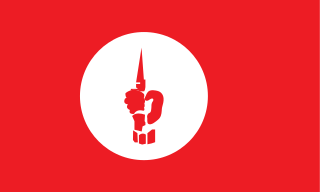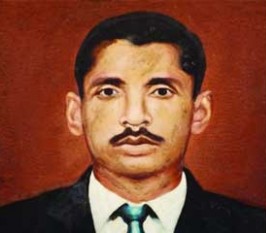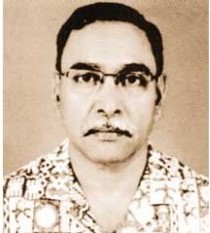Mustafa Kamal BS, better known as Shaheed Sipahi Mustafa Kamal was a sepoy in the Bangladesh Army during the Liberation War. He was born on 16 December 1947 in Hajipur village of Daulatkhan upazila under Bhola district. His father, Habibur Rahman was a Havilder. On 18 April 1971, Mustafa Kamal was killed in a defensive battle against the Pakistan Army in Daruin village of Brahmanbaria. He was posthumously awarded Bir Sreshtho.
Hamidur Rahman, BS was a sepoy in Bangladesh Army during the Bangladesh Liberation War. Rahman was killed on 28 October 1971 at Dholoi during the Battle of Dhalai, Srimangal during an attempt to capture the Pakistani Army's position. The advancing Indian Army and Mukti Bahini column finally captured the Dhalai Border Outpost on 3 November 1971. He was posthumously awarded the Bir Sreshtho, the highest recognition of bravery in Bangladesh. The Dhalai post was eventually captured permanently by three infantry battalions belonging to 61 Mountain Brigade, one battalion belonging to East Bengal Regiment and 7 Rajputana Rifles supported by an artillery brigade of the Indian Army fought against 12 Frontier Force Regiment of the Pakistan Army.
Munshi Abdur Rouf BS was a Lance Nayek in the East Pakistan Rifles during the Bangladesh Liberation War. He enlisted in the East Pakistan Rifles on 8 May 1963, and was attached with a regular infantry unit during the War of Liberation. Rouf died on 8 April 1971 at Burighat in Chittagong Hill Tracts after causing extensive damage to the Pakistani Army with his machine gun and forcing them to retreat. He was buried at Naniarchor Upazila in Rangamati District.
Muhammad Ataul Gani Osmani, was a Bengali military leader. Osmani's career spanned five decades, beginning with service in the British Indian Army in 1939. He fought in the Burma Campaign during World War II. After the partition of India in 1947, he joined the Pakistan Army and served in the East Bengal Regiment, retiring as a colonel in 1967. Osmani joined the Provisional Government of Bangladesh in 1971 as the commander-in-chief of the nascent Bangladesh Forces. Regarded as the founder of the Bangladesh Armed Forces, Osmani retired as a four-star general from the Bangladesh Army in 1972.
The Bangladesh Liberation War started on 26 March 1971 and ended on 16 December 1971. Some of the major events of the war are listed in the timeline below.

Operation Jackpot was a codename for three operations undertaken by Bengali Mukti Bahini in former East Pakistan against the Federation of Pakistan at the climax of the Bangladesh Liberation War.
Shafaat Jamil, Bir Bikrom was a Bangladesh Army colonel. He was the commanding officer of the 3rd East Bengal Regiment of Z Force Brigade in Sector 11 of Bangladesh Forces during the War of Bangladesh Independence in 1971. He was among the first Bengali officers who rebelled against the Pakistani Army in the 1971 Liberation War of Bangladesh and later fought in 11 sector and in Sylhet sector.

Ekattorer Dingulee is an autobiography by martyr-mother Jahanara Imam based on her experiences of the liberation war of Bangladesh in 1971.

The Mukti Bahini, also known as the Bangladesh Forces, was the guerrilla resistance movement consisting of the Bangladeshi military, paramilitary and civilians during the Bangladesh Liberation War that transformed East Pakistan into Bangladesh in 1971. They were initially called the Mukti Fauj.
Z Force, also known as Tura Brigade, was the first military brigade of Bangladesh Forces formed during the Liberation War of Bangladesh in 1971 under Major Ziaur Rahman along with the consent of the revolutionary government of Bangladesh in exile. The brigade was formed with the 1st, 3rd and 8th Battalion of East Bengal Regiment on 7 July 1971. It is the first ever complete brigade formed during the Liberation War of Bangladesh in 1971.
The Crack Platoon was a special commando team of the Mukti Bahini which was formed in 1971 during the Bangladesh Liberation War. It was formed by young members of Mukti Bahini which carried out commando operations in Dhaka and its surroundings and led by Major Khaled Mosharraf. The commandos were mostly students and civilians, received guerrilla training later in the training camps for Mukti Bahini and then engaged in battle against Pakistan Army.
Md. Nazim Uddin was a Bangladeshi freedom fighter. He was awarded Bir Protik for his contribution to the Liberation War of Bangladesh.
Md. Golam Mostofa was a Bangladeshi freedom fighter. He was awarded Bir Bikrom and Bir Protik for his contribution to the Liberation War of Bangladesh.
Khondkar Nazmul Huda was a veteran of the Bangladesh Liberation war. The Bangladesh government awarded him the title of Bir Bikrom for his bravery in the war of independence.

Lieutenant Colonel (Retd.) Quazi Sazzad Ali Zahir is a veteran of the Bangladesh Liberation War. The Bangladesh government awarded him the Bir Protik gallantary award for his bravery in the war. He was conferred with the Independence Award, Bangladesh's highest civilian in 2013 and India's fourth highest civilian award the Padma Shri on November 9, 2021.
Badrul Alam was a squadron leader of the Bangladesh Air Force who fought in the Bangladesh War of Independence, for which the government of Bangladesh gave him the Bir Uttam award, the second highest award for individual gallantry in Bangladesh. In 2016, he received the Independence Day Award.

Belayet Hossain was a heroic Freedom Fighter of the Bangladesh Liberation War. For his bravery in the war of independence, the government of Bangladesh awarded him the title of Bir Uttam.

Liaquat Ali Khan is a freedom fighter of the Bangladesh Liberation War. The Bangladesh government awarded him the title of Bir Uttom for his bravery in the independence war.
Mohammad Ziauddin, BUT is a retired Bangladeshi military officer, who was the Commanding Officer of the 1st East Bengal Regiment during the Bangladesh Liberation War. He was awarded the Bir Uttom, the country's second highest gallantry award for his outstanding bravery in the Liberation War. His certificate number was 22.
Shahid Shamsuzzaman was a freedom fighter during the Bangladesh Liberation War. He was posthumously awarded with a Bir Uttam by the Government of Bangladesh.





